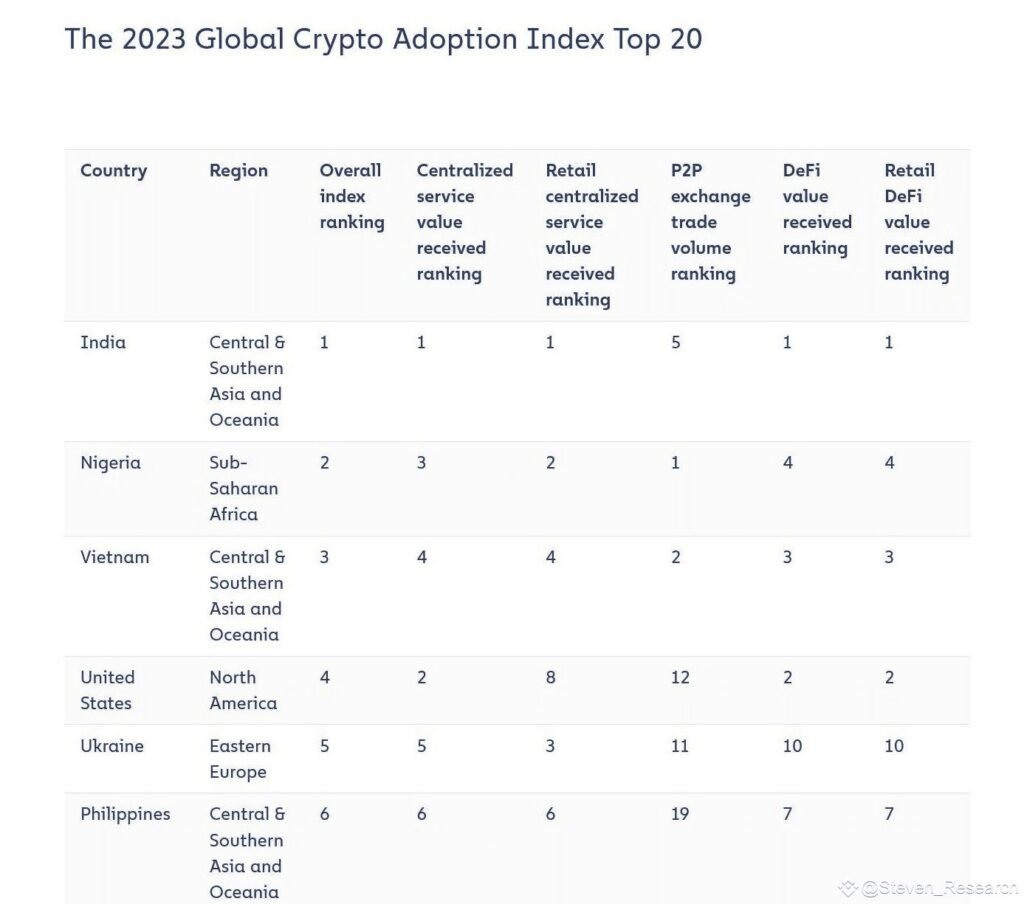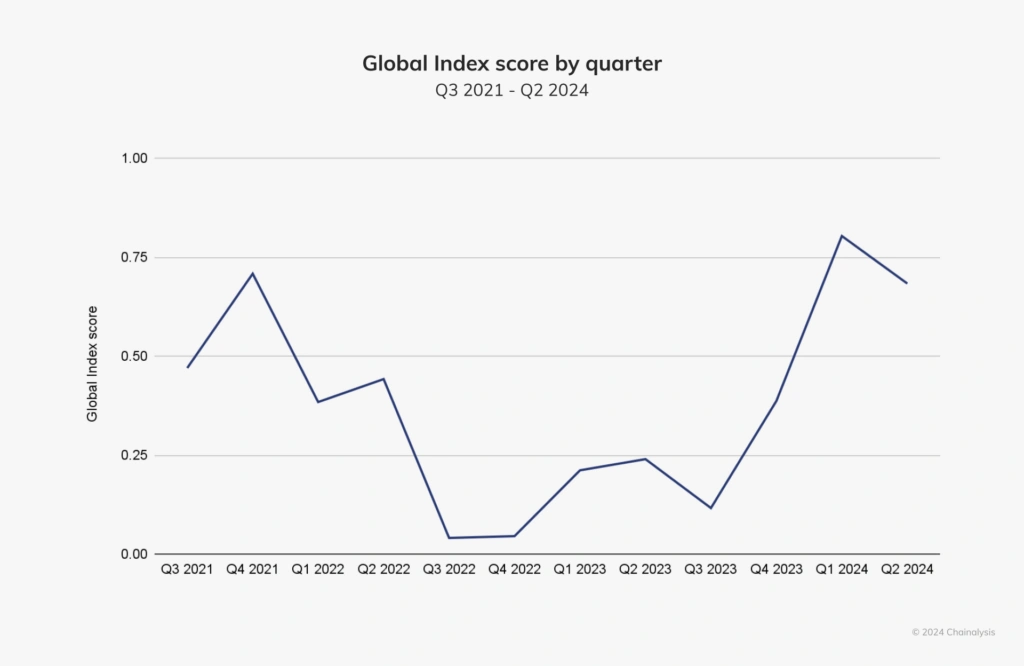Vietnam Crypto Adoption: FAQs About the Country’s Global #5 Ranking
September 6, 2024

In 2024, Vietnam officially secured a place in the top five countries in the world for crypto adoption, according to data published by Chainalysis. For a nation still navigating its legal stance on digital assets, the ranking has caught the attention of analysts, investors, and even government officials. But for everyday observers, this might raise more questions than answers.
This article explores the most common questions people are asking about Vietnam’s crypto journey, from why the country ranks so highly to what it means for investors and newcomers. Instead of treating this like a list of facts, we’ll walk through each topic in plain terms—connecting real-world behaviors to global trends, and the future possibilities ahead.
Why Did Vietnam Crypto Adoption Rank So High?

Credit from Binance
Vietnam’s #5 ranking in the 2024 Global Crypto Adoption Index wasn’t based on hype or headlines—it was driven by real usage. The methodology behind the index emphasizes grassroots participation. That means it looks closely at how everyday people are using digital currencies, not just how much institutional capital is flowing through the system.
In Vietnam’s case, individuals are engaging with crypto in ways that go beyond speculative trading. Chainalysis noted high levels of activity across centralized exchanges, widespread use of DeFi platforms, and consistent transaction volumes among retail-sized users—those making smaller, personal transfers under $10,000. When adjusted for population and purchasing power, these metrics point to a strong, organic adoption curve.
In short, Vietnam’s crypto engagement is not just large in size—it’s deeply embedded in the daily lives of many users.
What’s Fueling Vietnam’s Crypto Growth?

Credit from Chainalysis
The reasons behind this Vietnam crypto adoption growth are multilayered. First, the country’s demographics play a huge role. With a majority of the population under 35, Vietnam is home to a digitally native generation. This group is not only fluent in technology but also quick to explore new financial tools—especially ones that bypass the limitations of traditional banking.
Secondly, accessibility is an issue. Many rural or low-income communities in Vietnam are still underserved by banks, but smartphones and internet access are widespread. Crypto, in this context, acts as an equalizer. It offers an alternative to people who might not otherwise participate in the financial system.
There’s also the global nature of Vietnam’s economy. A large number of Vietnamese citizens work overseas and send money back home. In these cases, digital currencies offer faster, cheaper alternatives to traditional remittance services.
And finally, there’s the appeal of opportunity. For many young Vietnamese, digital assets represent a chance to generate wealth, start businesses, or participate in global innovation. This entrepreneurial drive is evident in the rise of local blockchain startups and developer communities.
How Big Is Vietnam’s Crypto Market?
The numbers are significant. In 2023, Vietnam’s crypto transaction volume reached an estimated 120 billion US dollars—an increase of about 20% over the previous period. To put that into perspective, this figure is three to four times larger than the country’s foreign direct investment in the same year.
Moreover, surveys suggest that over 20% of Vietnam’s population owns some form of digital asset, making the country second in the world in terms of crypto ownership relative to population. That level of penetration is extraordinary when compared to the global average, which sits at around 8.7%.
Is Crypto Legal in Vietnam?
Currently, Vietnam operates in something of a legal gray area when it comes to cryptocurrencies. Digital assets are not recognized as legal tender, and there are no specific laws defining their use, taxation, or regulation. This doesn’t mean crypto is banned, but it does mean that there are few formal protections or structures in place for users, businesses, or investors.
Without an established regulatory framework, many Vietnamese blockchain companies register in crypto-friendly jurisdictions such as Singapore or the United States, while continuing to operate in Vietnam. This has led to concerns about tax losses and accountability gaps.
Policymakers are aware of the situation. In recent public discussions, several lawmakers have stressed the need for a formal strategy—one that can regulate trading, prevent fraud, and ensure Vietnam doesn’t become a blind spot for illicit activity. There’s a growing consensus that regulation is necessary not just to protect consumers, but to foster healthy growth in the sector.
What Are the Risks for Crypto Users in Vietnam?

Credit from Nikkei Asia
Without a legal safety net, Vietnamese crypto users face some notable risks. Scams and fake tokens remain a problem, and with no regulatory body enforcing compliance or transparency, fraudulent schemes can spread quickly.
There’s also the issue of price volatility. Cryptocurrencies can fluctuate wildly within days, and inexperienced investors may be caught off-guard. For those unfamiliar with how wallets, private keys, and smart contracts work, even a small technical error could lead to irreversible losses.
Education is another challenge. While interest is high, understanding remains uneven. Many new users enter the market with little financial literacy or technical knowledge, relying on online forums or word-of-mouth advice—sometimes from questionable sources.
Industry voices like Bitget CEO Gracy Chen have pointed out that legal risks and limited user awareness are currently two of the biggest vulnerabilities in Vietnam’s otherwise promising market.
What Does This Mean for International Investors?
For global investors watching Vietnam’s ascent, the country presents a fascinating but complex opportunity. On one hand, the numbers are compelling—millions of engaged users, a growing base of developers, and high transaction volumes. On the other, the lack of legal clarity makes direct investment more complicated.
Still, Vietnam’s crypto boom reflects a broader trend among emerging economies, where blockchain technology is being embraced as a tool for financial inclusion and digital innovation. With the right policies in place, Vietnam could become a major regional player, not just in adoption but in infrastructure, research, and development.
What’s Next? Will Vietnam Regulate Crypto?

Credit from Fintech News Singapore
There are strong signs that regulation is coming. Vietnamese lawmakers have already begun discussing how to define, categorize, and tax digital assets. One of the key motivations is economic: with over $120 billion flowing through the crypto space, it’s clear that untaxed income and activity are slipping through the cracks.
Industry leaders are advocating for laws that support both transparency and growth. The goal is not to restrict crypto but to build a legal ecosystem that supports legitimate projects, educates users, and makes the country more attractive to investors.
If Vietnam Vietnam crypto adoption can strike the right balance, it may not only maintain its top-five position—it could become a true blockchain hub in Southeast Asia.
Final Thoughts: Why Vietnam’s #5 Ranking Deserves Attention
Vietnam’s ranking in the 2024 Global Crypto Adoption Index is more than a data point—it’s a reflection of a country in transition. In a space often dominated by large financial players and regulatory uncertainty, Vietnam’s crypto journey has emerged from the ground up.
Driven by curiosity, necessity, and ambition, the Vietnamese crypto community is showing the world what organic adoption looks like. And while challenges remain—particularly in education, security, and governance—the potential for long-term, sustainable growth is clearly there.
For beginners, investors, and observers alike, Vietnam’s story is a compelling case study in how crypto can evolve in unexpected places—and perhaps reshape what the global financial future might look like.

